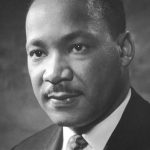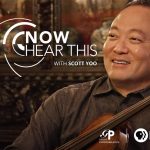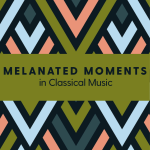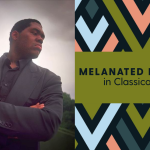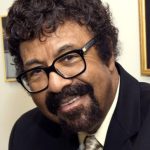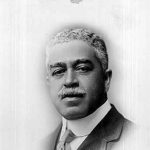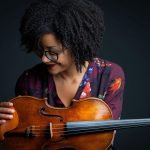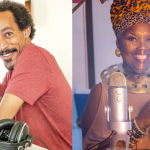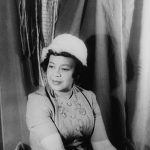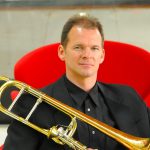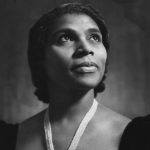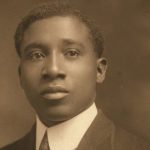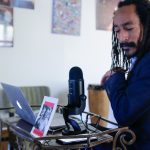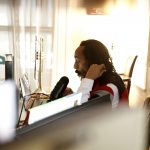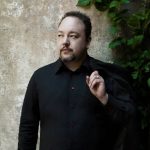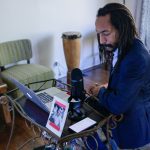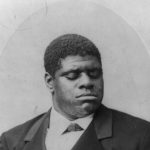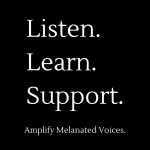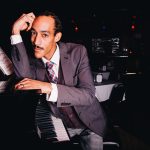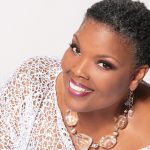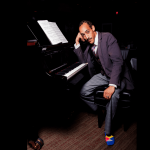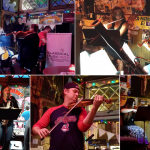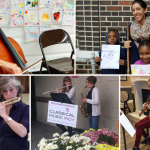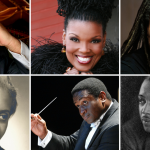MMCM S4E3: On Creation, Culture, and Connection with James Lee III
Angela and Joshua introduce and interview composer James Lee III. Lee gives us a peek into his composing process, deeply rooted in his fascination with and inspiration from his cross-cultural and musical background. Listeners are treated to three exquisite compositions that indicate why Lee is prized and in constant demand for his musical imagination and socio-historical significance.
Featured Music:
“Sonata for Violin and Piano”
“Niiji Memories,” performed by the Columbia Orchestra, featuring flutist Julietta Curenton, conducted by Jason Love
“Beyond Rivers of Vision,” performed by the Minnesota Orchestra, conducted by Scott Yoo
Angela Brown (00:00):
Before we get started with this episode, we wanted to thank our listeners for your amazing support of this podcast. We can’t wait to bring you future episodes, but we need your support. Just go to givebutter.com/melanatedmoments to help share more stories of exceptional Black artists with thousands of listeners across the US and around the world.
Joshua Thompson (00:27):
And if you’d like more information on each episode, go to our website or follow us on social media.
Angela Brown (00:33):
Follow my foundation on Facebook @morningbrown or on the web at morningbrown.org.
Joshua Thompson (00:41):
And follow me, Joshua Thompson, on Instagram as @SockJoplin.
Music Plays (01:02):
[MMCM Theme Music]
Joshua Thompson (01:02):
Welcome one and all to another wonderful episode of Melanated Moments in Classical Music. I’m your co-host Joshua Thompson.
Angela Brown (01:09):
And I’m Angela Brown. Hey, Josh.
Joshua Thompson (01:13):
Hey, Angela.
Angela Brown (01:16):
Baby. [Laughter] Today we have a young African American composer that hails from St. Joseph, Michigan and who is ripping up the game with his compositions that are being commissioned and performed by orchestras all over the land.
Joshua Thompson (01:32):
Okay, so this is interesting. Now, now, auntie, you usually bring all of the outstanding vocalists to the show. So why are we changing it up? Why did you decide to bring a composer to the foray today?
Angela Brown (01:44):
Well, I first heard of this young man at my church, oddly enough. I found out that he is actually the brother of my then pastor. One of his pieces was being world premiered on a church concert series here in Indy. And I just had to go and meet and hear his music. Now, since then, he has blown up all over the place. You can hear his compositions being performed by orchestras, such as the National Symphony, Detroit Symphony, Indianapolis Symphony, Cincinnati, Atlanta, Omaha, PA Philadelphia. And the list goes on and on, baby!
Joshua Thompson (02:24):
[Laughter] Well, Imma tell you, take a breath, take a breather, ’cause this sounds right. This guy sounds amazing and, and wildly inspiring. So please, would you introduce us to your special guest today?
Angela Brown (02:36):
Yes, I will please welcome Mr. James Lee III to Melanated Moments in Classical Music. Hey James!
James Lee III (02:43):
Hey Angela, how are you? Good to be here.
Angela Brown (02:47):
Oh, we are so excited to have you here. You know, you are just hot on the streets right now. Can you tell me like what made you want to compose music? What, what, what gets in your brain and, and gives you the inspiration to create all of these beautiful melodies that you have been giving us?
James Lee III (03:13):
Well, you know, it was kind of like a suppressed desire for a while. Even in high school, I would, um, well I started piano lessons when I was 12. So very late after my father, uh, came home one day and told me he registered me for piano lessons for school.
Angela Brown (03:28):
[Laughter] Okay.
James Lee III (03:29):
And you know, I thought that was just for girls. I didn’t wanna be bothered with piano. I was playing sports at the time. So I finally gave in and then I was pretty much passing a lesson method book once a week. I mean, every week I was passing a different level.
Angela Brown (03:45):
Wow. Were you considered a child prodigy?
James Lee III (03:50):
No, I don’t think so. Um…
Angela Brown (03:52):
But you was consuming, you know, method books once a week!
James Lee III (03:56):
I mean, well, I had a piece played by Maryland Symphony Orchestra last, last year and they actually coined the “concert prodigy.” So I guess they, they included me in that, but, but, um, I had never really considered myself a child prodigy. I mean, it wasn’t like I was playing, uh, you know, like really advanced music, uh, like someone might play in college.
Angela Brown (04:21):
Uh, huh.
James Lee III (04:22):
Yeah.
Angela Brown (04:23):
Okay. Okay.
James Lee III (04:25):
Yeah, like one of my teachers from University of Michigan, his daughter is playing pieces that I was playing in college.
Angela Brown (04:32):
And how old is his daughter?
James Lee III (04:34):
Uh, I think nine or 10 years old.
Angela Brown (04:36):
Oh yeah she’s a prodigy, she’s a prodigy. Alright I understand.
Joshua Thompson (04:41):
James, it sounds like, and this is, this is how it works for some, I think, uh, so correct me if I’m wrong, you, you come to piano a little bit late at 12, but you just have this ravenous ability to really absorb and to, to quickly, you know, move through methods. Do you think that’s one of the reasons why your brain was kind of subconsciously telling you you’re supposed to be writing your own because it’s the consumption of new music is, was easy enough for you. Right? Does that, does that question make sense?
James Lee III (05:09):
Yeah, I can see that. I mean, when I was 12 years old, I was, um, in elementary school writing my own man-, my own staff paper and the teacher who saw me told me, well, you know, there there’s manuscript paper that exists. So it wasn’t until later that I got manuscript paper and I started to write down my own music. But I remember at, at the University of Michigan, William Bolcom, always made this statement that I was learning fast. He really thought that for my, the first time I, uh, was in the program for my master’s degree and started lessons, he really felt that the time I was there and that short amount of time for the masters, I was really learning quite quickly. So I just think I was very passionate about it and I really, uh, devoured it.
Angela Brown (05:54):
Okay. Well, because of your passion, who inspired you, who were, who were some of your greatest inspirations?
James Lee III (06:03):
Probably my teachers that I had, I think William Bolcom, Michael Doherty, and especially Bright Sheng. I was very happy to have him attend. I had a premier with the Detroit Symphony and a piece called Amer’ican that was, um, that’s about, uh, Native and Black Indians. And he was there and it was very, very gratifying to hear him say that I had, I mastered the orchestra, like I have mastered writing, writing for the orchestra. So, I mean, that was really good ’cause that’s what I write mostly in. So it was really gratifying ’cause I always looked up to him. I was always inspired by his, his music having heard him at, at Michigan. Then I was a, he recommended me for, to be a composition fellow at Tanglewood. So then, hearing his music at Tanglewood also when I was a fellow there. It wasn’t until my senior year at the University of Michigan when I was preparing my senior, uh, piano recital that I thought, you know, I’m probably not gonna be, uh, so successful as a concert pianist. And I’d rather compose my own sonatas than having to practice sonatas, etudes so much. So I decided to switch after my bachelor’s degree. I, uh, I had applied to, uh, Peabody Conservatory and the University of Maryland for piano performance master’s degree and I was accepted, but, uh, I decided to stay at Michigan for composition.
Angela Brown (07:24):
Okay.
Joshua Thompson (07:25):
Was that a, was that a tough decision for you between the, the, the piano part and then the, the composition, or was it fairly easy for you to, uh, to, to make that, that decision?
James Lee III (07:35):
Maybe a little tough because I had been known more for playing the piano and, um, you know, I was writing on the side and you know, my parents wanted me to stick with it, but I really couldn’t see myself, uh, with the kind of goals that I had in mind to, uh, be a success as a pianist. And I didn’t wanna be adjudicating high school piano competitions or this and that. So I decided, yeah, I let me do something even harder. Right.
Angela Brown (08:04):
Okay, okay. Well, because we want to be able to enjoy as much of your music as possible. Let’s go ahead and get right into the first piece. Here we have Sonata #2 for violin and piano, and then we’ll come back and discuss.
Music Plays (08:20):
[James Lee III’s “Sonata #2 for Violin and Piano”]
Joshua Thompson (09:31):
This is I, I absolutely love this way, James. There is so much energy, this, this pulse and drive throughout the beginning of this before it really just mellows out. This is I, this is a fun one to listen to.
James Lee III (09:47):
Oh, appreciate it. Yeah, this is, uh, I wrote it for a married couple, you know, the, uh, the pianist were, we were friends at the University of Michigan and she actually recorded, uh, much of my piano music that was released on the Albany record label back in 2014. So she asked me to write a Sonata for her and her husband to premier at some point. So I did it for them to premiere back in 2018 and they memorized everything. So, yeah. This piece is about little over 20 minutes or so 22 minutes, something like that. And they memorized all of this.
Joshua Thompson (10:22):
That is, that’s some epic like brain power. I I’m listening to a lot of this and I, and I just have a, a question that’s kind of broader for the genre. Do you, do you find yourself focusing on yourself as a classical composer, new music, or, um, are you really kind of in your own lane when you’re, you’re coming up with ideas and thoughts and, and putting them down to paper?
James Lee III (10:47):
Well, broadly I’m considered, I guess like a contemporary classical composer. Uh, I always try to find a balance between, uh, those sounds that may be considered more academic or dissonance and, and the kind of accessibility. Yeah. Accessibility. I found, you know, it’s interesting people tell me different places. Like I had a piano trio premier at Tanglewood in November and the elderly, uh, part of the, the audience they always tell me. And they told me at Tanglewood also that, “You know, I didn’t think I would like new music, but, you know, there was something about yours that I could really appreciate it resonated with me.” So I always try to find that balance. Like I, like, I like to say to go to the, the inner soul of the individual.
Joshua Thompson (11:30):
Absolutely. That I think that’s a, that’s a wonderful, a wonderful point. Do you, do you find yourself, um, you’re saying academic there’s, there’s a hint of a little George Walker, uh, from me when it comes to some of these, right. As, as kind of bridging the gap between that new classical and, and kind of like that academic pedagogy you’re, you are referring to.
James Lee III (11:52):
Well, I’ve certainly heard his music and I, I played his, um, George Walker’s first piano sonata on my senior recital. So certainly there’s some of that, you know, I, I like to use some of the, uh, traditional forms, but not be so confined to a, like a textbook example of what needs to happen at certain moments in the piece. I, I like to kind of work on pacing and when certain events happen and then I, I try to go in a different direction that may be different from what a listener might be expecting.
Angela Brown (12:24):
Okay. Well, I have a question. The next piece we’re, we’re the next piece we’re wanting to, uh, highlight is “Niiji Memories.” And I want to know, how did you come up with the, um, the subject matter? What about this made you want to write this piece?
James Lee III (12:48):
Oh, I’m glad you asked that question. I’ve been very, I’m very passionate about this. You know, growing up, I, a mother would always tell me that we were, uh, American Indian or had American Indian in her, in her family, especially, and many people who were called African Americans before were known as American Indians, or they simply called Negro. And I saw online these, um, these paintings that were called an, An Emblem of America. And it was a Black woman with a bow and arrow. And it was from 1798 and it said it was in the British museum. So back in 2019, I premiered a song cycle with, with, uh, Alison Buchanan, who was back and forth between London and New York. And we, we, we did the piano and there’s a, there’s a version that is piano, cello and soprano. But this one we did was just soprano and piano. And I went to the British museum and I asked them about this painting, and it is, it exists. It’s actually there. And there are other paintings that show Black, uh, American Indians. And I was just really captivated by this cause I had heard so much about this history, uh, growing up, especially my mother’s side. So Niiji is a term that, uh, Indians would use or American Indians would use to talk about themselves as a friend, being friends on this continent, which they called Niiji Ssland.
Angela Brown (14:11):
Wow.
James Lee III (14:12):
The first movement I used a mode and I called it, a melody that really is coming from the Black church. Like “I love the Lord,” you know, that kinda pentatonic. So that’s what happens in the first movement. The second movement, I called it, a, um, a Choctaw uh, song in a powwow. And the third one is just basically this time for the Niiji, the, the American Indian to sing. And I’m really talking about the ones of color. There are, there were different nations here. And the ones that Hollywood shows a lot that people often think of are the Native Americans, which are more of the Mangalloy type, the plain Indians, which are different from like the American Indian type of, uh, people, more people, more of darker color, ’cause like the term American in 1828, that definition was someone who was of copper color, an Aboriginal of copper color, whom the Europeans found when it came here and then later applied to of course, people from Europe, uh, after that. So I really wanted, um, Julietta Curenton, who also has Creek in her family. Oh. To be, be the face of this piece. So that’s how that came about.
Angela Brown (15:24):
Okay. And she is the daughter of Evelyn Simpson Curenton. Am I correct? Yeah, we we’ve, we’ve highlighted her on Melanated Moments. Well, I think let’s listen to some of “Niiji Memories.”
Music Plays (15:39):
[James Lee III’s “Niji Memories,” performed by the Columbia Orchestra, featuring flutist Julietta Curenton, conducted by Jason Love]
Angela Brown (20:10):
Absolutely fabulous. I mean, I hear the memories, I hear the wind, I hear the birds chirping. I hear nature in this. What was, was this something that you were thinking about when you were composing this piece?
James Lee III (20:28):
Uh, definitely. Yeah, definitely. That’s kind of the idea of, uh, of the mankind being created. I did this in another piece called Amer’ican, uh, that I was mentioning earlier, but, um, yeah, this is, I think this is probably one of my favorite pieces-
Joshua Thompson (20:44):
I could tell!
James Lee III (20:45):
In, in recent time, like I love this topic. I’ve been writing other topics before that I’m, I’m very glad to, uh, table. But, uh, but, uh, yeah, I’m really passionate about this. People aren’t really talking about it, musically.
Joshua Thompson (20:59):
What I mean and it’s, and it’s easy to, to figure out why, again, thank you, like with that cultural cross-cultural context that you set up behind it, and it’s very like the pans wood flute, and you think of little sprites, you know, hopping around everywhere. You do this wonderful way of, of adding color and your composition is so layered and textured and it it’s, but it’s not, it’s not overdoing it. It’s just a beautiful balance of swells. And, um, I, I don’t know. I could listen to this all over, run it back, run that back.
Unison (21:32):
[Laughter]
Angela Brown (21:34):
One thing that I, as, as, as, I mean, yes, I’m a classical singer. Um, but as a layperson, just listening to symphonic pieces, this lays very easily in the ear. It’s something that I want to go back and taste and listen to more and more and glean more and more images from, it’s not that quote unquote 20th century music, which we are past that now, but that is all atonal and crazy and weird.
Unison (22:04):
[Laughter]
Angela Brown (22:04):
This feels good, you know.
Joshua Thompson (22:11):
James, let me, sorry. Let me, let me ask you, James, is this one of these pieces where you find yourself more actively championing and, and really being like, hey, symphony orchestra’s all over, this is the work I want you to, to perform?
James Lee III (22:25):
Oh yes. Most definitely like the, the Columbia Orchestra is gracious to commission me to, to, uh, write the piece. They are a community orchestra here in Maryland, but, um, I really want Angela to- I’m I’m sorry, not Angela, Julietta to be able to play this, uh, many places because like the, the first one is nice. The second one, but if you heard, if you ever hear the third movement Niiji songs, I mean, that is the, for me, that’s the most gorgeous part of the piece. And you can see when Julietta plays, she there’s this one part where she arises, near the very end of the flute ascends to this line. And you can just see the satisfaction in her face.
Joshua Thompson (23:04):
It it’s a, it’s a stunning piece. Do you mind telling us, you refer to, to the flautist, Julietta, um, who, who is that? And did you, did you specifically request for, for her?
Angela Brown (23:18):
I already told you who Julietta was. She’s the daughter of Evelyn Simpson Carenton, but go ahead. Let’s hear your relationship with miss Julietta.
James Lee III (23:28):
Yeah, well, sure. Um, I don’t know if you’re familiar with the Rich Chamber Players. They are a, uh, Black American, uh, chamber music group that based in Jacksonville, Florida. And they, uh, they actually requested me to be their composing residence one year and Julietta was playing on some of their concerts. So she actually premiered a chamber music piece of mine called “Night Benches of Kapur” and that’s for flute, clarinet, violin, cello, and piano. So I remember her playing from then back in Jacksonville. So, uh, she also played, I think it was maybe at Rochester at the Gateways Music Festival.
Joshua Thompson (24:09):
Okay, yeah.
James Lee III (24:10):
But I remember talking with her and really proposed an idea to her, at some point, I wanted to write a flute concerto. I loved her sound. So that’s how that, that came about. So when I asked the Columbia Orchestra to work in this project, because that, that’s one thing I’ve noticed, you know, I’m, I’m usually commission to write like 10 to 15 minute pieces, but it’s more difficult to get these, um, concertos until now. I actually have a piano concerto in the works, but I can’t say, uh, which orchestras yet, but, but, um, but yeah, you know, the community orchestras, like Columbia, were more, uh, willing to proceed with that kind of project. So I told them I wanted Julietta to be the soloist for the piece.
Angela Brown (24:53):
Okay. So now how do you end up with these commissions?
James Lee III (24:59):
Um, usually like the Amer’ican piece, I propose it to the, uh, Detroit Symphony and then other orchestras, they will approach me for an idea. That’s how it’s been working lately. And then from working with them, like, let’s say an orchestra plays a, a piece that’s already been in existence for a few years or whatever. Then, they might become more interested in my music, which is the case with St. Louis, for example, they, they played a piece in the fall. They’re playing another piece in the, in March next month. And then they’re playing a different piece. That’s coming November, and they’re commissioning to write a piece for January next year.
Joshua Thompson (25:35):
Goodness. Uh, you stay busy, sir.
James Lee III (25:40):
Yeah. I have like four commissions I’m working on now.
Angela Brown (25:44):
How many pieces do you have out in, in the, in the atmosphere? How many have you completed?
James Lee III (25:50):
You know, I never know. I, I have to count. I don’t, I don’t really count. I just write and then it like, and then when I finish that, I go on to the next project. Usually I’ll put the ones that I’m satisfied with on my website and my publisher will have it available.
Joshua Thompson (26:04):
You know, I, I really like this because sometimes in this field for, for anyone instrumentalist, vocalist, composer, we, we kind of live in a very content hungry industry. And I love how you just said that you’re committed to the work when your stuff is done. It’s done. And then it’s on to the next, it’s not necessarily about keeping score per se, right?
James Lee III (26:24):
No. Yeah. I usually, yeah. That’s how it works. Usually I’m working on one piece then once that’s done, you know, then sometimes like, because of the pandemic, I have a symphony being premiered this weekend in, in Hagerstown, Maryland. And you know, you kind of forget about what you did before, because the time goes on.
Joshua Thompson (26:41):
Well, and you could tell, cuz you sound so casual. You said it at least five times I have this commission and then they’re premiering this I’m like, you better work. I’m here for it.
Unison (26:48):
[Laughter]
Angela Brown (26:50):
And he’s loving it. He’s loving it. Now I had mentioned earlier in the, uh, introduction of you that your brother was my minister, uh, my pastor at my church here in Indianapolis. And I would like to know how much does the church play in your writings? I mean, do you have many sacred works that you’ve done?
James Lee III (27:13):
Oh, definitely. People when I, when you say sacred, I would say, uh, music that is inspired by biblical topics. Not, not necessarily, not necessarily that we play in the church. Not that it’d be wrong to play in a church, but typically church, um, organizations with their orchestras haven’t, um, I guess achieved a level of technical um, how should I say it? Technical flawlessness to be able to perform the work. So when, when I was at the University of Michigan, I, I was, uh, listening to a piece by Olivia Messian a French composer called The Quartet- or Quartet for the End of Time. And I was thinking as a seven day advent Adventist, Christian, how I am so influenced by The Prophecies of Daniel and The Revelation, I would actually lead Bible studies and I still do to this day lead Bible studies on this topic. And so that plays a huge role. And it has been from the, from the very beginning and people in the field have noticed that, and they’ll even make commentary, like even this piece that the Maryland Symphony is, is playing, uh, Sunday. They even billed it, uh, “Heaven and Earth,” you know, and I didn’t, I didn’t tell ’em what, what to say, but you know, some people get an idea about some of the pieces that I’ve produced that I’ve composed and they’ll, they’ll, um, perceive that I have an interest in, you know, biblical or spiritual matters too. That’s very part of my, my life.
Angela Brown (28:37):
Beautiful, beautiful. There is so many ways that you can witness without thumping a Bible. So you are right my brotha.
Unison (28:44):
[Laughter]
Angela Brown (28:44):
Let’s get into this last piece that we are, um, going to listen to. Tell us a little bit about “Beyond Rivers of Vision.”
James Lee III (28:58):
Okay. So this is my first piece based off of biblical or religious inspiration. It was my dissertation piece from the University of Michigan. And I found it funny that, you know, I was not in the doctoral program, I was not, uh, well, this piece was not offered a performance in the competition that they had for looking at doctoral pieces to see which they would, they would perform. So, uh, a year later I was in Leonard’s Slatkin’s office at the Kennedy Center and I showed it to him,
Angela Brown (29:30):
Just throw it off, Leonard Slatkin… I love it!
James Lee III (29:33):
Well, he was, he was, he was friends with, um, well, he is friends with, with my, one of my former teachers, William Bolcom. So I asked William Bolcom if he could gimme a little recommendation to him. So anyway, he wrote a little note for me. I met with Slatkin the week before, like that was given two options: the last week of February or March, and I chose February and it was good that I chose February because after he, uh, interviewed me and kind of talked about the piece, then it turns out that he invited me to a concert the same week and told me that this was on Tuesday, the Thursdays concert. He told me that they were going to premiere at the coming season.
Joshua Thompson (30:09):
Oh, wow.
James Lee III (30:11):
And then, then I was told not to mention it to anyone because it wouldn’t be released in the Washington Post until the next, the next week. So I think that he really, um, substituted, you know, took off one work and, and replaced it with my work, which is about 14 minutes. And this work is based on these rivers, the Heddekel, which is known as the Tigris River in Genesis, and then the same river in the book of Daniel Chapter 10 and where Daniel was given a vision near that river. And then the last movement has to do with the river of life and this idea of peace and paradise, this kind of imagery.
Angela Brown (30:50):
You are as deep as a river, as an ocean, my brother.
Joshua Thompson (30:53):
It’s that whole metaphysical composition and it’s oh man. Yeah. Let’s, let’s hear it. Let’s hear it
Angela Brown (30:58):
“Beyond Rivers of Vision.”
Music Plays (30:59):
[James Lee III’s “Beyond Rivers of Vision,” performed by the Minnesota Orchestra, conducted by Scott Yoo]
Angela Brown (34:19):
Oh my goodness. You, you know, it’s some, it’s so gratifying to listen to music that you know why it was created. Having a little bit of information before hearing the music. Now I understand why they have curtain talks before you, you know, you listen to a symphony because you can really get into it. And podcast has delivered on so many levels of, of just gratification and just feeling good today. Woo!
Joshua Thompson (34:50):
Agreed. I, I just have to say real quick, James, you you’re incredible. You are such a, it’s like listening to musical adjectives. You are able to draft and paint and create a picture in a set setting that is so engaging. It’s storytelling where you can hear the words, but there are none. On the edge of your seat with these pieces. This is, this is a phenomenal work. Just phenomenal.
James Lee III (35:17):
Oh, appreciate it. Thank you. Yeah.
Angela Brown (35:19):
And we wanna thank you for being part of this podcast today. And I just wanna put a little quick bug in your ear that I haven’t forgot about “Mother’s Lament.”
James Lee III (35:28):
Oh okay. All right. Yeah.
Joshua Thompson (35:30):
Now what is that? We’re not gonna just throw that out there like we know what you’re talking about.
Angela Brown (35:34):
Yeah, you know, it’s a piece that, that James did create. He didn’t write it for me or did you?
James Lee III (35:41):
Well, well…
Unison (35:45):
[laughter]
Joshua Thompson (35:46):
Answer wisely!
Angela Brown (35:49):
That’s a wink, nudge nudge!
James Lee III (35:50):
[Laughter]
Joshua Thompson (35:53):
What’d you say, auntie gon’ hustle today!
Angela Brown (35:54):
Hello, hello…
James Lee III (35:59):
[Laughter] Well, you, you know, I did wanna write it for, for you, Angela. So let’s just, let’s just say your voice was in my, was in my head as part of inspiration for that.
Joshua Thompson (36:08):
Oh, fantastic.
Angela Brown (36:08):
Well, thank you. And I still hope to find the perfect place to perform this, but… Josh, I don’t know about you, but I am inspired by our artist today. The output of music this young man has amassed at this young age is awesome.
Joshua Thompson (36:26):
I, you know, I’m not even gonna argue with you, I’m with you when you right. And, uh, what’s exciting is James, we, we really look forward to you just continuing to give and to give and give the, the talents that, that you have to the rest of the world for, for years to come. And with that being said, uh, I think it’s about time for us to get up outta here. Yeah. So I’m Joshua Thompson.
Angela Brown (36:50):
And I’m Angela Brown.
Unison (36:52):
And this has been Melanated Moments in Classical Music.
Angela Brown (37:04):
Melanated Moments in Classical music is a production of Classical Music Indy. Our producer is Ezra Bakker Trupiano our theme music was composed by Laura Karpman.
Joshua Thompson (37:17):
Melanated Moments in Classical Music is made possible in part by the Indiana Arts Commission, a state agency, and the National Endowment for the Arts, a federal agency. Additional support comes from the Indy Arts Council and the City of Indianapolis.
Angela Brown (37:33):
Our podcast partners are Morning Brown, Inc. and Symphony Tacoma.
[/su_tab] [su_tab title=”Related Blog Posts” disabled=”no” anchor=”” url=”” target=”blank” class=””]NEW CLASSICAL – NOW HEAR THIS
n this week’s playlist, we feature violinist and conductor Scott Yoo in honor of the 4th season of Now Hear This! Scott is the Host and Executive Producer of the program. The 4th season premiered this month in April with Scott traveling around the world learning about composers, Astor Piazzolla, Robert Schumann, Andy Akiho, and ending with Isaac Albéniz.
LOCAL CLASSICAL – MELANATED MOMENTS SEASON SIX
As we continue celebrating Black Music Month, this week’s playlist will feature music and artists discussed during the latest season of Melanated Moments in Classical Music. All of season six was recently released and featured vibrant discussions about artists such as Scott Joplin, Hazel Scott, Joseph Bologne, and Kenneth Overton, among others.
NEW CLASSICAL – NOW HEAR THIS
n this week’s playlist, we feature violinist and conductor Scott Yoo in honor of the 4th season of Now Hear This! Scott is the Host and Executive Producer of the program. The 4th season premiered this month in April with Scott traveling around the world learning about composers, Astor Piazzolla, Robert Schumann, Andy Akiho, and ending with Isaac Albéniz.
LOCAL CLASSICAL – BLACK MUSIC MONTH
In this week’s playlist, we celebrate Black Music Month which takes place in June. It was created by President Jimmy Carter in 1979 to honor and celebrate Black artists’ contributions to music. We’ll be honoring the late Herman Whitfield III, an Indianapolis native who was a gifted pianist and composer. We’ll also hear performances of artists who have been featured in season four of Classical Music Indy’s podcast, Melanated Moments in Classical Music.
NEW CLASSICAL – MISSY MAZZOLI
In this week’s playlist, we are featuring the works of Grammy-nominated American composer Missy Mazzoli. Missy is an active TV and film composer, writing music for the Amazon TV show Mozart in the Jungle, and is a pianist and keyboardist with Victoire, an all-female chamber rock quintet she founded in 2008 dedicated to her own compositions.
LOCAL CLASSICAL – MELANATED MOMENTS
In this week’s Black History Month playlist, we bring you recordings by composers, performers, and artists who have been highlighted in our podcast, Melanated Moments in Classical Music. Melanated Moments is the ward-winning podcast from Classical Music Indy that shines a spotlight on musical works composed by, for, and about Black people.
NEW CLASSICAL – MARK HETZLER
In this week’s playlist, we bring you performances by trombonist, Mark Hetzler. He was the former Principal Trombonist of the Hartford Symphony Orchestra and has performed with the Boston Symphony Orchestra and the Boston Pops Orchestra, as well as the Florida Orchestra, the Jacksonville Symphony Orchestra, the Springfield Symphony Orchestra, and the Palm Beach Opera Orchestra. One interesting fact about Mark is that he’s a member of the experimental rock band, Mr. Chair, where he plays his trombone while hooked up to an effects pedalboard, giving it an electric trombone feel.
LOCAL CLASSICAL – HOST OKARA IMANI
Hey, Starshine! This is Okara Imani, Media Production Fellow for Classical Music Indy, and your guide to The “I” in Classical Music. I’m here to highlight the cultural and social intersections of the classical art form, beyond the Classical Period and beyond the constructs of Euro-centric high society origins.
Ric’key Pageot: Inspiring a Moment to Learn, Acknowledge, and Respect
Ric’key Pageot: Inspiring a Mo …
Ignatius Sancho: Composing the Hypocrisy of Colonialism & Convention
Ignatius Sancho: Composing the …
NEW CLASSICAL – ROBERT PATERSON
In this week’s New Classical playlist, we’ll be featuring works by American composer Robert Paterson. Robert Paterson was named Composer of The Year in 2011 by the Classical Recording Foundation at Carnegie’s Weill Hall. His music has been on the Grammy ballot for the past six seasons, and his works have appeared on National Public Radio’s Best of the Year lists for classical music and regularly appear on radio playlists across the United States.
NEW CLASSICAL – DR. BILL BANFIELD
This week we bring you the music of Dr. Bill Banfield. Dr. Banfield is an award-winning composer whose symphonies, operas, chamber works have been performed and recorded by major symphonies across the country. Few have a wider, performed professional composing output, that has had public concert performances, reviews, radio, recordings of some 12 symphonies, 7 opera, 9 concerti, chamber, jazz, and popular forms. This alone making Dr. Banfield one of the most performed, recorded composers of his generation. In 2010 and 2016, Dr. Banfield served as a Pulitzer Prize judge in American music.
#AmplifyMelanatedVoices
Classical Music Indy stands with our Black community. We are here to listen, learn, and lend our support. We believe that classical music is powerful; that it evokes a range of human emotions and creative expression.
Angela Brown Brings her Unbridled Zeal to a New Podcast.
Angela Brown brings her unbrid …
Local Classical – Angela Brown
We continue our Black History Month programming this week with our featured artist, soprano Angela Brown. Born in Indianapolis, Brown has led a world-renowned career as a vocal soloist. Her highly successful Metropolitan Opera debut in the title role of Aida captured instant attention from international print and broadcast media and catapulted Angela onto the world’s prestigious opera and symphonic stages.
Classical Thanksgiving Playlist
Thanksgiving is a time for food, family and friends, and great classical music. We at Classical Music Indy want to make sure you have the right musical ambiance for your special meal, so we’ve created the perfect playlist for your Thanksgiving celebration.
Highlighting our Female Performers
Classical Music Indy employs a diverse range of musicians for our events around Indianapolis. In 2016 we hired 95 musicians. Classical Music Indy has dedicated our blog articles to outstanding women musicians this month. We’ve shared about great women music educators in America and about under-recognized women musicians throughout history. This week, we take a look at a few of Classical Music Indy’s top performers – women who are doing great work here and now in the city of Indianapolis. Read below about these incredibly talented musicians, and hopefully you’ll hear them at one of our events in the near future!


